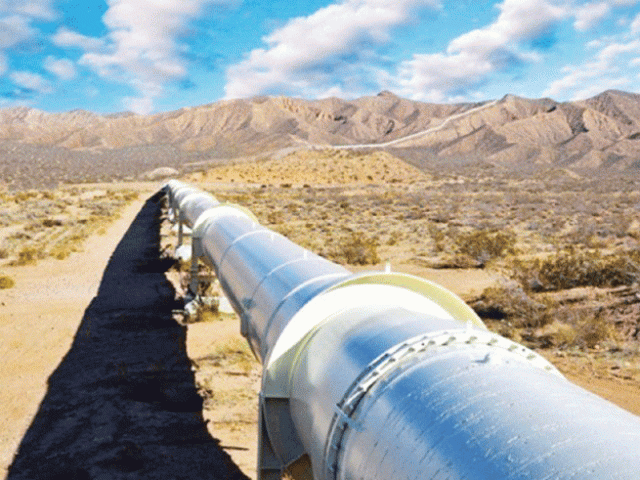Iran-Pakistan pipeline: a much-needed lifeline
Calling the energy crisis in Pakistan the mother of all crises is not an exaggeration

Calling the energy crisis in Pakistan the mother of all crises is not an exaggeration by any stretch. I have iterated the deteriorating effect of the crisis on all factions of society in previous articles as ignoring this elephant in the room is not something we, as a nation, can afford anymore. At the heart of this crisis is the rapid depletion of the country’s energy resources, coupled with a glaring lack of further exploration and development. Pakistan’s heavy reliance on finite energy sources, primarily natural gas and oil, has created a precarious imbalance between supply and demand.
It is indeed an unfortunate state of affairs for a country neighbouring Iran, which holds the world’s second-largest gas reserves, amounting to 33 trillion cubic metres, second only to Russia. However, to tap this resource, we need a balance of courage and determination on the political side and delicate craftsmanship on the foreign policy front. Unfortunately, the Pakistan Democratic Movement (PDM) leadership threw the towel from the onset during its PDM 1.0 tenure when Prime Minister Shehbaz Sharif declared that “Beggars can’t be choosers!”. This resignation to fate meant that we gave up on this issue before even trying, as highlighted by the US Assistant Secretary of State for South and Central Asia, Donal Lu, in the recent congressional hearing. He informed the committee members that Pakistan did not even approach the US for a waiver to build the pipeline with Iran.
As an alternative, we have been given another pipeline option in the past – the Turkmenistan-Afghanistan-Pakistan-India (TAPI) – originating from Turkmenistan, which is even more geopolitically complicated as the majority portion of this pipeline will pass through Afghanistan, a region fast becoming the most volatile and hostile. Additionally, the TAPI pipeline traverses challenging terrain, including mountainous regions and potentially seismic areas, which could pose technical and logistical challenges during construction and operation. These challenges could lead to delays and cost overruns, further complicating the project’s viability.
The Iran-Pakistan gas pipeline project offers several long-term benefits to Pakistan that could significantly impact its economy, energy security, and regional relations. Firstly, the pipeline can provide a stable and reliable source of natural gas, helping to meet the country’s growing energy demands. This would reduce the country’s reliance on more volatile and less efficient imported fuels, such as coal, oil, and liquefied natural gas (LNG), and help stabilise energy prices, benefiting consumers and industries alike.
Read Pakistan to seek US waiver for Iran gas pipeline project
Secondly, the pipeline project could better Pakistan’s economic ties with Iran, leading to increased trade and investment opportunities. The project can act as a major confidence-building step, especially in the backdrop of a recent unfortunate flare-up in the security situation in the region bordering both countries. The project could also pave way for further regional cooperation, potentially opening up new markets for Pakistani goods and services.
Additionally, it holds the promise to strengthen Pakistan’s energy security by diversifying its sources of energy. This would reduce the country’s vulnerability to supply disruptions and geopolitical pressures, enhancing its overall energy resilience.
Overall, the Iran-Pakistan gas pipeline project has the potential to significantly contribute to Pakistan’s economic development, energy security, and regional cooperation, making it a crucial component of the country’s long-term energy strategy. However, so far, the government’s response to such a critical infrastructure project, aimed at securing the future energy supply, remains very ambiguous and conflicting.
On one hand, our foreign ministry spokesperson told Voice of America (VoA) recently that we do not need a US waiver to build a pipeline within our territory, on the other hand, we have done nothing yet to build the 80 kilometres segment of the pipeline, as agreed upon by the interim government. This inaction took place despite the deadline being September 2024 which can help avoid $18 billion in fines and penalties. Notably, in a recent statement from the Minister of Petroleum Musadiq Malik it seems that finally, the government has decided to approach the US government for the much-needed waiver.
Moreover, the recent letter by US President Joe Biden to PM Shehbaz Sharif after years of silence gives some hope for a potential softening of Washington’s stance on Pakistan. This certainly opens a window of opportunity to get the waiver passed through the House by comprehensively presenting the case for the project through effective lobbying.
THE WRITER IS A FINANCIAL MARKET ENTHUSIAST AND IS ATTACHED TO PAKISTAN’S STOCKS, COMMODITIES AND EMERGING TECHNOLOGY
Published in The Express Tribune, April 8th, 2024.
Like Business on Facebook, follow @TribuneBiz on Twitter to stay informed and join in the conversation.



















COMMENTS
Comments are moderated and generally will be posted if they are on-topic and not abusive.
For more information, please see our Comments FAQ